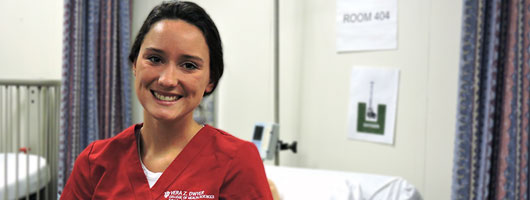 Pictured | Lexie Meister | Bachelor of Science in Nursing | Bremen, Indiana (hometown)
Pictured | Lexie Meister | Bachelor of Science in Nursing | Bremen, Indiana (hometown)
About the Bachelor of Science in Nursing
The Bachelor of Science in Nursing (BSN) degree is a program strives to offer a creative, evidence- based curriculum for meeting the current and future health needs of society. The curriculum prepares a generalist in professional nursing and serves as a basis for graduate study. The BSN program has been recently updated to reflect the ever-changing healthcare environment. The lower division courses include all the prerequisite sciences, liberal arts and general education courses that provide the solid foundation for the upper division nursing curriculum. The outcomes of the BSN nursing curriculum provides the generalist entry- level professional nurse with the abilities to holistically and critically think using evidence- based practice and clinical reasoning skills within a theoretical framework.
The BSN degree prepares graduates to successfully pass the national licensing examination (NCLEX) to become a Registered Nurse (RN). An RN is a licensed professional who protects, promotes, and optimizes individuals’ health and abilities, prevents of illness and injury, alleviates suffering through diagnosis and treatment of human disease. Registered Nurses are informed, caring advocates for individuals, families, and their communities. As an entry-level professional nurse, BSN RN graduates can and do work in a variety of settings, including the traditional acute and tertiary hospital setting, to community-based and outpatient centers, and nontraditional positions such as research assistants and in medical sales.
Academic Advising
Advising holds are placed on all Vera Z. Dwyer College of Health Sciences new beginner and transfer students prior to advance registration and are released following advising appointments. Students with a declared major are advised in their academic units. To determine who your advisor is and how to contact them, see One.IU.
Degree Requirements (120 cr.)
Degree Map >>
Students receiving the Bachelor of Science in Nursing degree must complete 120 total credit hours including:
- IU South Bend Dwyer College of Health Sciences Campuswide General Education Curriculum (38 cr.)
- Additional requirements (24 cr.)
- Major concentration and elective requirements (63 cr.)
- A minimum of 30 credit hours at the 300- or 400-level
- Courses required for the major must be completed with a grade of C or higher. A minimum CGPA of 2.0 is required.
Additional Requirements (24 cr.)
All courses are 3 credits unless otherwise designated.
- . HEM-C 102 Elementary Chemistry 2
- MICR-M 250 Microbial Cell Biology
- MICR-M 255 Microbiology Laboratory (2 cr.)
- PHSL-P 261 Human Anatomy and Physiology 1 (5 cr.)
- PHSL-P 262 Human Anatomy and Physiology 2 (5 cr.)
- PSY-P 103 General Psychology
- PSY-P 216 Life Span Developmental Psychology
Nursing Requirements
The degree program has 63 credit hours of required nursing courses. Students must be formally admitted to the nursing major to enroll in the following nursing courses. The nursing course sequence is identified by semester numbers and is generally completed in the order shown below. Nursing courses begin with the junior year after formal admission. Students are required to successfully complete the entire set of courses which the School of Nursing designates each semester and must complete each level before progressing.
Fourth or Sophomore Two (12 cr.)
- HSC-H 322 Epidemiology and Biostatistics
- PHIL-P 102 Critical Thinking and Applied Ethics
- PHSL-P 262 Human Anatomy and Physiology II (4 cr.)
Photo credit | Teresa Sheppard